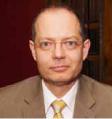I have been a Consultant Neurosurgeon at King’s College Hospital since September 2005. I have a PhD in Biological Sciences from the University of Warwick and extensive research experience in traumatic brain injury and the mechanisms of brain cell death. I undertook specialist training in neurosurgery in Liverpool and Birmingham followed by a Clinical Fellowship in Richmond, Virginia, USA. I am currently the Lead Neurovascular Surgeon at King’s College Hospital and the Associate Clinical Director for Trauma.
I was the first surgeon in the UK to perform the non-occlusive cerebral vascular bypass technique. In addition to this expertise in degenerative spine disease which includes the management of back and neck pain, arm pain and sciatica together with peripheral nerve disorders such as carpal tunnel syndrome; I have specialist expertise in the management of neurovascular conditions (e.g. cerebral aneurysms, AVMs, Cavernomas, AV fistulas), the surgical treatment of stroke (decompressive craniectomy and revascularisation for Moya-Moya, Sickle Cell Anaemia and trauma. My expertise extends to the use of radiosurgery (CyberKnife and GammaKnife) for the treatment of such conditions.
Directory:
Tags:
Keyoumars Ashkan underwent dual postgraduate training in surgery and medicine, obtaining Membership of the Royal College of Physicians (MRCP) in 1997 and the Fellowships of the Royal College of Surgeons of England and Glasgow (FRCS) in 1998. Thereafter, he underwent higher specialist training in general neurosurgery in London being awarded the Fellowship of the Royal College of Surgeons in Neurosurgery (FRCS SN) in 2002. His sub-specialist training in stereotactic and functional neurosurgery included a fellowship in France with Prof. Benabid, generally considered as the founder of the modern deep brain stimulation surgery, which led to a MD degree. He was appointed as a consultant neurosurgeon at King's College Hospital in January 2007. He is also a Reader at King’s College London.
In addition to his expertise in degenerative spine disease which includes the management of back and neck pain, arm pain and sciatica together with peripheral nerve disorders such as carpal tunnel syndrome; Mr Ashkan’s main interests are neuromodulation surgery and brain tumours. This includes deep brain stimulation, spinal cord stimulation and occipital nerve stimulation for movement disorders, pain and headaches and; image guided, minimally invasive and stereotactic surgery for brain tumours including awake craniotomies; Gamma and Cyberknife radiosurgery.
Directory:
Tags:
Keyoumars Ashkan underwent dual postgraduate training in surgery and medicine, obtaining Membership of the Royal College of Physicians (MRCP) in 1997 and the Fellowships of the Royal College of Surgeons of England and Glasgow (FRCS) in 1998. Thereafter, he underwent higher specialist training in general neurosurgery in London being awarded the Fellowship of the Royal College of Surgeons in Neurosurgery (FRCS SN) in 2002. His sub-specialist training in stereotactic and functional neurosurgery included a fellowship in France with Prof. Benabid, generally considered as the founder of the modern deep brain stimulation surgery, which led to a MD degree. He was appointed as a consultant neurosurgeon at King's College Hospital in January 2007. He is also a Reader at King’s College London.
In addition to his expertise in degenerative spine disease which includes the management of back and neck pain, arm pain and sciatica together with peripheral nerve disorders such as carpal tunnel syndrome; Mr Ashkan’s main interests are neuromodulation surgery and brain tumours. This includes deep brain stimulation, spinal cord stimulation and occipital nerve stimulation for movement disorders, pain and headaches and; image guided, minimally invasive and stereotactic surgery for brain tumours including awake craniotomies; Gamma and Cyberknife radiosurgery.




